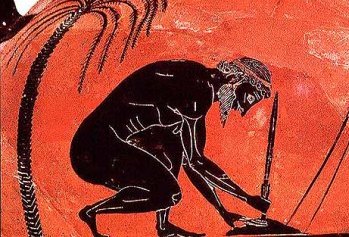
April 15, 2013, by Alan Sommerstein
Death and honour, honour in death
When a person dies who was in life a towering but also a deeply controversial figure, how far, if at all, is it appropriate for those who hated her while she lived to continue giving expression to their hatred in word and deed? Like so many other perennial human questions, this one was pondered over by a Greek tragic dramatist – in this case Sophocles, in connection with the death of Ajax. Ajax had been more than merely controversial: he was without question guilty of some very grave crimes, including the attempted murder of the leaders of the army in which he himself held a command.
Throughout the Trojan War, Ajax had been one of the outstanding figures in the Greek army. He had saved it when it had its back to the wall (or rather the sea) in the absence of Achilles; later, when Achilles was killed by Paris, he had rescued the hero’s corpse from the enemy and carried it back to camp. At Achilles’ funeral, his armour, made by the god Hephaestus, had been put up to competition as a prize for the best man in the army, and many thought that Ajax would win it. But it was awarded to Odysseus – perhaps because Odysseus was the more persuasive speaker (Ajax tended to say straight out what he was thinking, bluntly and briefly), perhaps because of corruption or fraud in the voting process.
Ajax was outraged, and resolved to take revenge on all those who had slighted and humiliated him – which meant the whole army and especially its leaders, whom he planned to murder in a night attack. But the goddess Athena drove him mad, and he tortured and killed cattle and sheep (and a few of their herdsmen), thinking they were his enemies. Athena was determined to save the army so that the Trojans, whom she hated, could be destroyed; but she also had issues with Ajax himself – he had more than once made it clear that he felt that “anyone can be successful with the aid of the gods – I am sure that I can gain glory even without such aid”.
When Ajax realizes what he has done, he also realizes that there is nothing left for him but to die, and he falls on his sword; his final speech includes savage curses against the army and its leaders. Those leaders, in particular the head of the whole expedtion, Agamemnon, and his brother Menelaus, order that his body shall be left unburied, and the passive resistance of Ajax’s family looks likely to be unavailing. But of all unlikely people, it is Odysseus, his great rival, who insists that the funeral must be allowed. He says to Agamemnon:
“This man was once my greatest enemy in the army … but for all that I will not so dishonour him as to deny that he was the best among all us Greeks who came to Troy, except for Achilles. So it would be wrong for you to dishonour him: you would not be harming him, but nullifying the laws of the gods. It is not right to try to hurt a brave man when he is dead, not even if you hated him.”
And when, after further exchanges, Agamemnon asks him “Are you telling me to let this corpse be buried?” Odysseus simply replies “Yes, for I too will one day be what he is now.”
Agamemnon accepts defeat, with a very bad grace, and Odysseus turns to Ajax’s brother Teucer, offering to be “as much your friend as I was formerly your enemy” and to join in the funeral rites. Teucer is full of gratitude and admiration, but he feels he cannot grant Odysseus’ request because it might offend the spirit of Ajax, and Ajax is buried by his family and his soldiers alone. Sophocles’ audience will have known that Ajax’s spirit never did forgive Odysseus. In the eleventh book of Homer’s Odyssey, Odysseus sees Ajax in the underworld and pleads for a reconciliation; Ajax’s only reply is to turn and go away.
It is clear, though, what view Sophocles is encouraging us to favour. But do you think he is right? Should death wipe out hatred, as Odysseus argues? And is it right for the deceased person’s family to refuse, as Teucer did, the funeral tribute of a former enemy?
Alan Sommerstein
No comments yet, fill out a comment to be the first

Leave a Reply